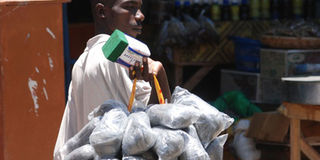Traders count losses over Eastleigh crackdown

A man hawks steel wire and scrubbers in Eastleigh Section 3, April 08, 2014. Traders in Nairobi's Eastleigh shopping centre say they have been forced to make do with slow business and fewer working hours because of the police crackdown on illegal immigrants and suspected criminals. DENISH OCHIENG
Traders in Nairobi's Eastleigh shopping centre say they have been forced to make do with slow business and fewer working hours because of the police crackdown on illegal immigrants and suspected criminals.
Mr Hassan Gulled, the chairman of the Eastleigh Business Community told the Nation Wednesday that many of the traders in the area close earlier than usual to avoid police harassment.
“The business at the moment is very bad. We are estimating a reduction of about 70 per cent in sales. Our members are closing early because no one knows what happens in darkness,” Mr Gulled said in an interview.
“We normally receive customers from as far as Uganda, Rwanda, Burundi and South Sudan. We are not getting them anymore. Some have called in to say they will come after the operation is over.”
Mr Gulled complained that businesspeople especially roadside sellers in Eastleigh have been harassed since Saturday especially from 8 in the evening; the time these people make most sales, he said.
Police on Saturday launched Operation Usalama Watch to weed out illegal immigrants suspected to be behind a recent spate of terror attacks in the country. The crackdown was countrywide, but in Eastleigh alone, 500 people were arrested on day one. The operation has continued since then.
Mr Gulled said his association supports any security operation to safeguard the country, but argued that the attendant harassment by the police has been scaring away customers who often throng Eastleigh. The police though deny this accusation insisting they are only interested in aliens and criminals.
When we visited the township Wednesday, more traders complained of “bad business.” At a kiosk off 7th Street, Ms Hadibah Wayame who sells camel milk told of her goods going bad because her targeted customers have reduced.
“My milk has been spoiling. I am no longer taking new stock because most of those who buy my milk were arrested for lack of national IDs,” she said. Her kiosk is an umbrella roof on a pole under which she arranges a dozen or so 20-litre containers. On a normal day, she says sells nine of such containers. But now the business is slow and she can hardly sell more than three.
Ms Halima Abdalla, her colleague sells milk by day but turns to bitter coffee in the evening. That coffee business has been suspended because she closes her business before seven in the evening to avoid meeting with the dreaded police.
The story is the same, only the details vary. Along Eastleigh’s main street, Mr Ali Mohamed, a shoe dealer at the Sunrise Shopping Mall told the Nation his clients who mostly come from other east African countries have been scared away.
“Business keeps changing by the day, even during normal days. But since the operation, we have just been sitting in this verandah reminiscing over the past. Even Kenyan shoppers are afraid of coming here.” he said.
For the past ten years, Mr Mohamed shop was located along a street that was always crowded with shoppers. That crowd, he said had disappeared. At the Alnasir Shopping Complex opposite Mr Mohamed, the owner of a clothes business says he has had to scale back production.
That shortage has created a chain. Cart pullers have poor business too; they are often hired by these traders to pull in new stock, and shopping bag sellers are singing the same song of bad business.
“I often sit by these shops to trap customers who buy shoes or clothes. Those are the ones who buy my bags most,” Anthony Mutua, a shopping bag dealer told us. His stock rack is situated in a corridor off the main street where collects about Sh8,000 a day, he says.
But the operation and the attendant discouragement of shoppers means he can’t sell worth Sh2,000 a day, these days.





